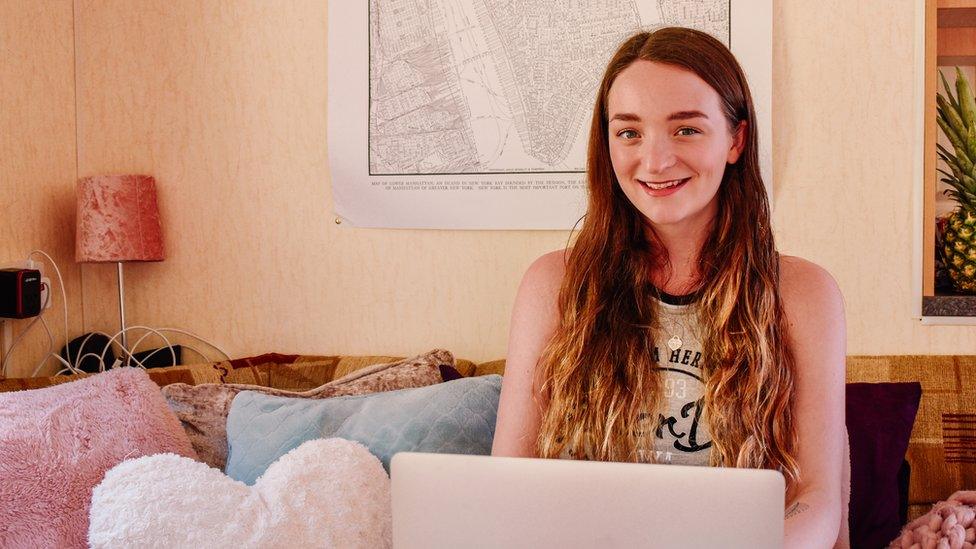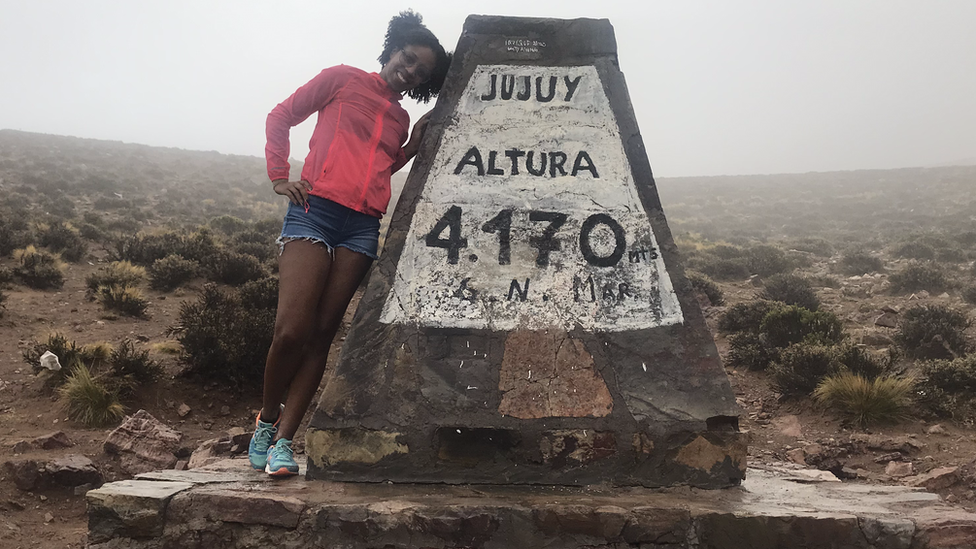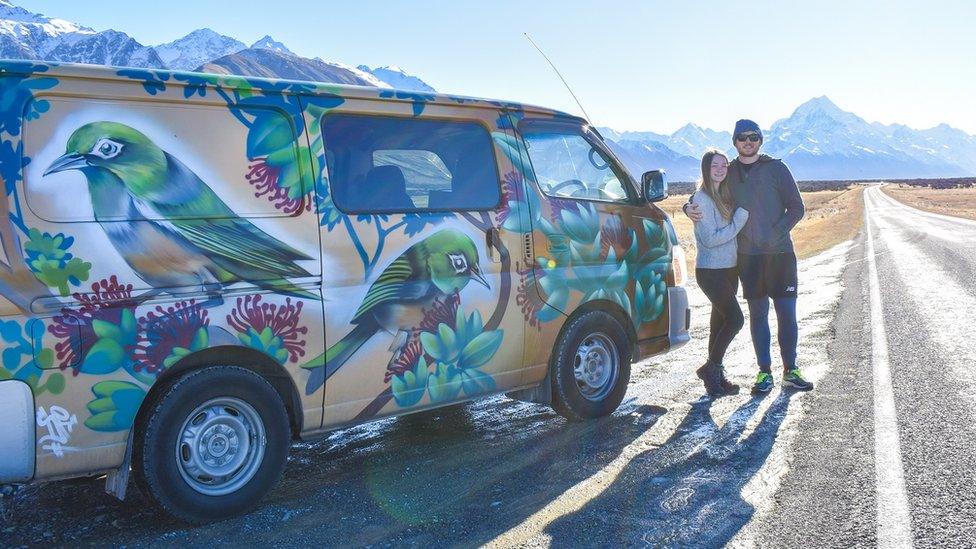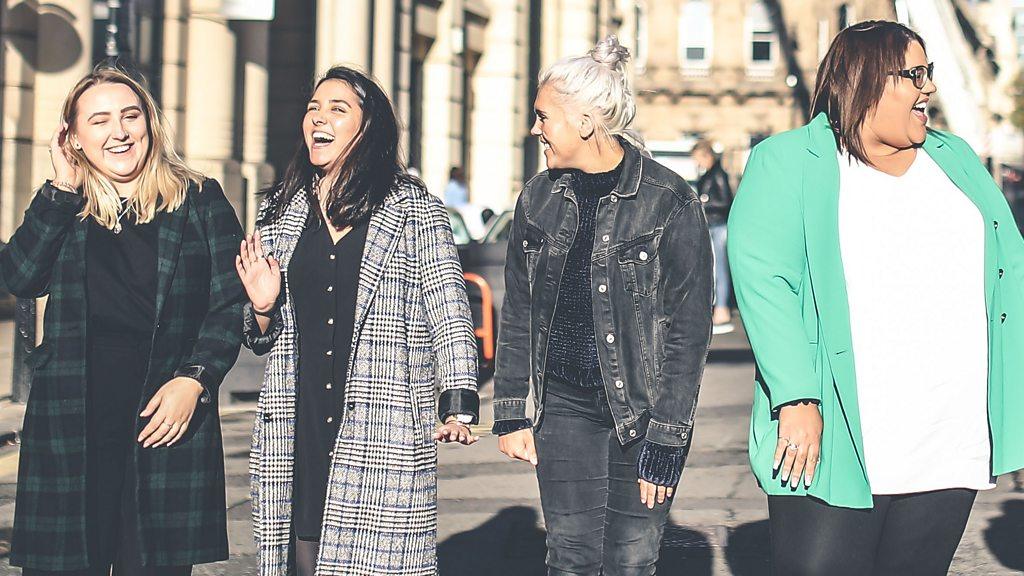'We are desperate to go travelling again'
- Published

Chloe Dickenson had to return to her parents' home in the north of England
Like many people, Chloe Dickenson's travel plans ground to a halt last year when the world was thrown into lockdown.
A so-called "digital nomad", the 22-year-old was living and working from her laptop overseas. In March 2020, she was 11 months into a stint across South East Asia and Australia when her and her boyfriend's itinerary had to be shelved.
"We were in Vietnam, and our original plan was to continue travelling around Asia," says the freelance writer and travel blogger. "But once it became clear that this wasn't really a possibility, we booked a flight to Greece for the end of March, with the intention of spending a few months in Greece, Montenegro, Albania and Croatia until the virus 'calmed down'."
However, seeing the pandemic quickly spread, they felt the best plan was to figure out how to return to the UK from Greece. "We were definitely in two minds about what to do, we definitely didn't want to go home just yet, but it seemed like the safest and most logical thing to do at the time," says Ms Dickenson.
So, on 15 March 2020, the couple embarked on a long journey home across Europe. "We travelled across four countries in 66 hours, and it took three planes, four cars and two buses for us to arrive home in the UK at my parents' house in Penrith, Cumbria."

Chloe Dickenson and boyfriend Matt have spent the past year living in a caravan
With improved wi-fi and flexible workspaces across the world, digital nomadism has boomed over recent years. And while the global travel restrictions caused by coronavirus have temporarily grounded many such nomads, longer term the movement is expected to grow much further.
This is a result of the pandemic making many of us realise that we don't actually need to go into the office. And nor do we want to return to it.
Jennifer Nelson, 39, from Miami, has been working remotely since 2016 when she quit her job and left New York. A digital marketing consultant, she had been living in Argentina for four months when worldwide lockdowns started in March 2020.
"Argentina closed borders, grounded all flights, and went into lockdown without much warning," she says. "It was a very scary time as there were a lot of us expats and digital nomads in Argentina wondering what to do.
"The US embassy started announcing emergency flights back to the US for those stuck. But those flights at the time were $3,000 (£2,165) plus. So in the end, I decided to stay in Argentina as they announced that they were extending all visas, and ultimately I had no choice since there were no commercial flights out."

Jennifer Nelson decided to stay in Argentina for most of last year
Ms Nelson stayed in an Airbnb in Buenos Aires. "I had a community of other expats and Argentines who I was able to talk with," she says. "We were mostly all in a WhatsApp group sharing quarantine memes. That's how we got by and stayed sane."
By the end of the year she decided to move on to Miami for two months, and then to Hawaii where she currently is.
Emmanuel Guisset is the founder and chief executive of co-living space Outsite, which is targeted at digital nomads and has 27 locations worldwide, including in Bali, Costa Rica and Portugal. He says his company felt the pain early last year but has rebounded since.
"There were a lot of cancellations and refunds," he says. "By July we bounced back. In the US people could still travel [domestically] and people wanted to be closer to nature and move to smaller cities."
As such Outsite's locations in Hawaii and on the coast near San Diego in southern California have proven popular. But with the company centred around people sharing facilities in communal areas did that put off people?

Emmanuel Guisset balances work with his love of surfing
"Our target market of people in their 30s and 40s don't seem to mind," says Mr Guisset, a keen surfer who has spent the past year remote working from Hawaii, Mexico, Portugal and California. "And we ask people to wear masks in communal areas."
He adds that he is now very hopeful about the future because as a result of the pandemic "remote working is no longer a niche".
This is certainly backed up by figures from the US. There were 10.9 million digital nomads in the US by the end of last year, according to a study by business consultancy MBO Partners, external. This was 49% higher than 7.3 million in 2019.


New Economy is a new series exploring how businesses, trade, economies and working life are changing fast.

Meanwhile, a number of countries and other territories have launched schemes to attract digital nomads. In July last year the Caribbean island of Barbados announced that such workers could pay $2,000 (£1,444) to live there for one year.
Dubai in the United Arab Emirates subsequently launched a similar programme, as did the Cayman Islands and Estonia.

Chloe Dickenson and her boyfriend, pictured here in New Zealand, want to get back to their old travelling life
Robert Litchfield, co-author of the book Digital Nomads, agrees that the phenomenon "is only going to increase".
"I don't think anyone has said, 'I'm done with nomadism [because of the pandemic] and I'm going back to the office cubicle,'" says Dr Litchfield, who is an associate professor at Washington & Jefferson College, Pennsylvania.
"Something that's pretty exciting is that a lot more people are going to recognise this as a possibility," he says. "Although digital nomads will remain avant garde, I'm hopeful that it could improve a lot of people's lives."

Outsite's properties are generally located in places with good weather
Chloe Dickenson and her boyfriend Matt have been riding out the pandemic living in a caravan in the garden of her parents' home in the north of England. She says they are "desperate to go travelling again".
"I thought we'd be back on the road in less than six months after arriving home, but over a year later and here we still are," she says. "It was pretty hard to get accustomed to being stuck in one place again, especially after experiencing all the incredible and vastly diverse cultures that we were lucky enough to enjoy.
"We'd love to head back to Malaysia for at least three months as soon as possible as it was one of our favourite places while travelling." However, Ms Dickenson wants to ensure that they've both had both doses of their Covid vaccinations before they travel abroad again.
Meanwhile, Jennifer Nelson says she is waiting for the world to be vaccinated. "I won't be making any big moves until vaccines are mostly rolled out and travel isn't complicated anymore. If I do travel again - outside the States - it won't be until 2022, I'm thinking."
Related topics
- Published6 May 2021
